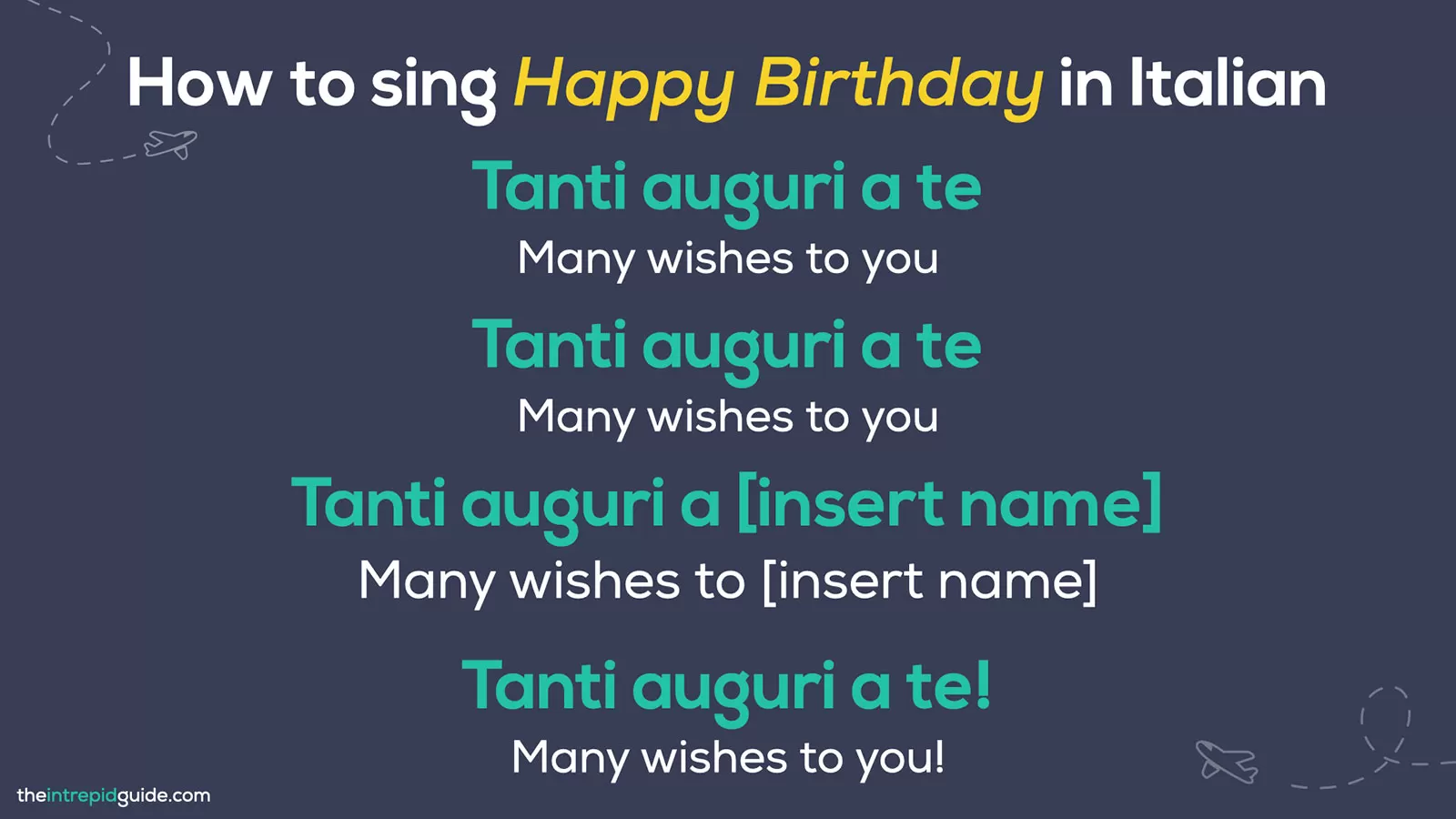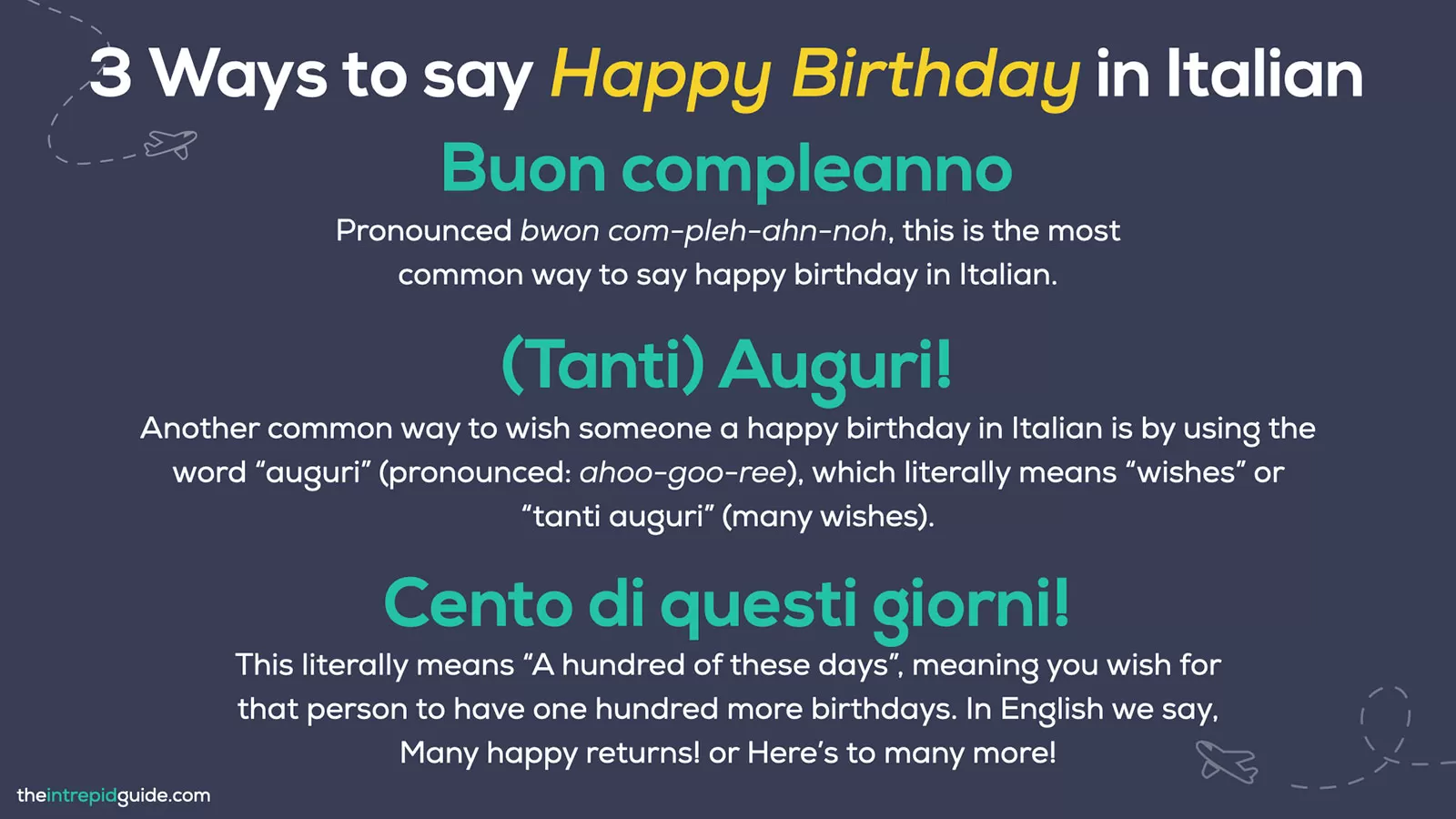Italians love to celebrate birthdays, anniversaries, festivities and other special events. But it can be hard to know what expressions of well-wishes to say and when to say them. If you’re not careful, you could end up saying the wrong thing! More on that later.
In this guide, we’ll take a look at the most used and useful Italian expressions and traditions related to birthdays! So the next time an Italian friend’s compleanno (birthday) comes up, you’ll be able to let them know you’re thinking about them and send your birthday wishes in Italian.
We’ll look at how to wish someone a happy birthday in Italian both in person and in a card or text message plus how Italians actually celebrate plus the one strange Italian birthday tradition you should know.
Iniziamo! (Let’s get started!)
How do you say Happy Birthday in Italian?
There are a few ways you can wish somebody a happy birthday in Italian, from the more traditional phrases to the more creative and colloquial ones. Let’s start with the most common!
1. The most common way to say Happy Birthday in Italian: Buon Compleanno

“Buon compleanno” (pronounced bwon com-pleh-ahn-noh) is certainly the most common way to say happy birthday in Italian.
Note how the adjective “buono” generally means “good” but here it takes the meaning of “happy”. It is super common to find “buono” in fixed phrases expressing some kind of wish.
You’re probably already familiar with the expressions “Buon Natale” (Merry Christmas) or “Buon Anno” (Happy New Year). Here are other expressions of well-wishes that use “buono”:
- Buona giornata / serata (Have a good day / evening!)
- Buon viaggio (Have a good trip!)
- Buona domenica (Happy Sunday!)
- Buon divertimento (Have fun!)
- Buon onomastico (Nappy name day!)
- Buon anniversario (Happy anniversary!)
Back to our “buon compleanno”, you can use this expression on its own or you can add terms of endearment and address it to someone specific mentioning your relationship to them, such as:
- Buon compleanno, caro / cara! – Happy birthday, dear (male / female)!
- Buon compleanno, amico mio / amica mia! – Happy birthday, my friend (male / female)!
- Buon compleanno, bella! – Happy birthday, beautiful (for women)!
- Buon compleanno, tesoro! – Happy birthday, sweetheart!
- Buon compleanno, sorellina! – Happy birthday, little sister!
- Buon compleanno, zio! – Happy birthday, uncle!
Or you can make this wish more personal by mentioning the age somebody is turning, especially if it’s an important milestone worth celebrating, such as:
- Buon diciottesimo compleanno! – Happy 18th birthday!
- Buon trentesimo compleanno! – Happy 30th birthday!
- Buon cinquantesimo compleanno! – Happy 50th birthday!
2. How to say Happy Birthday in Italian using Auguri!
Another common way to wish someone a happy birthday in Italian is by using the word “auguri” (pronounced: ah-oo-goo-ree), which literally means “wishes”.
Very often people use the expression “tanti auguri” (many wishes) to say “happy birthday” in a slightly more emphatic way or they combine it with “buon compleanno”, to form:
- Tanti auguri di buon compleanno! – Many wishes for your birthday!
- Tantissimi auguri! – Lots of best wishes!
Use the following phrases if you want to let them know your wishes come from your heart:
- Auguri di cuore! – Heartfelt wishes!
- Tanti auguri dal profondo del cuore! – Happy birthday from the bottom of my heart!
Another popular, informal expression is “auguroni”, literally “big wishes”, which is formed by adding the augmentative suffix -oni onto the end of “auguri”.
The phrase “(tanti) auguri” is a bit more versatile than “buon compleanno”; in fact, it is not only used on birthdays but also on other special occasions, such as festivities, holidays, anniversaries, or for having a baby, getting a promotion, graduating. Here are some examples:
- Tanti auguri per la festa della mamma! – Happy Mother’s Day!
- Tanti auguri di buona Pasqua! – Happy Easter!
- Tanti auguri per il tuo traguardo! – Congratulations on your achievement!
- Avete appena avuto un bambino? Auguri! – You just had a baby? Congratulations!
3. Say Cento di questi giorni!
If you’re thinking of writing a birthday card in Italian, there are other expressions you can use besides the traditional “auguri” and “buon compleanno”. One of these is:
- Cento di questi giorni! – Many happy returns! / Here’s to many more!
This literally means “A hundred of these days”, meaning you wish for that person to have one hundred more birthdays. This expression is not as popular among younger generations though, as it sounds a bit old fashioned.
Other common ways to wish someone a happy birthday in Italian
Another option is to use the verb “augurare”, literally, “to wish”. Here are a few examples you may find inspiring when writing a birthday card in Italian:
- Ti auguro una giornata piena di gioia e spensieratezza. – I wish you a day full of joy and light-heartedness.
- Ti auguro di passare una splendida giornata in compagnia dei tuoi cari. – I wish you a wonderful day in the company of your loved ones.
- Per il tuo compleanno ti auguro il meglio. – For your birthday, I wish you all the best.
- Spero che tutti I tuoi desideri si avverino. – I hope all your wishes come true.
When to wish someone a happy birthday in Italy
Italians are quite superstitious: they worry when they see a black cat crossing the street, they touch iron (not wood) to ward off evil spirits and they like to wear red and eat lentils on New Year’s Eve to attract good luck and money for the coming year (learn about these and more Italian superstitions here). If you are wondering: what does all this have to do with birthdays? Well, you should know that Italians have certain “rules” about when to wish someone a happy birthday too.
You can start sending wishes to the birthday boy or girl starting from midnight on their birthday, and it is even acceptable to send them late saying:
- Tanti auguri in ritardo! – Happy belated birthday!
When NOT to wish someone a happy birthday
One thing that you should never do is wish someone a happy birthday before the actual birthday. Seriously, not, not even the day before! Not only is saying happy birthday in advance considered rude but it is also believed to bring bad luck.
 How to ask somebody about their age in Italian
How to ask somebody about their age in Italian
If you want to talk about your age and the day you were born and ask others about them, there are a few questions and expressions you can use.
The general way to ask someone about their age is:
- Quanti anni hai? – How old are you? (Lit. “how many years do you have?”)
To which the person will respond:
- Ho 25 anni. – I’m 25 years old. (Lit. “I have 25 years.”)
Note how in Italian we don’t say that we are X years old, but rather we “have” X years. On the actual birthday, you can ask the birthday boy or girl:
- Quanti anni compi oggi? – How old are you today? (Lit. “How old do you turn today?”)
Here, the verb “compiere” means “to turn a certain age”. The answer to this question will be:
- Compio 30 anni. – I am turning 30.
Here are a few more questions you can ask to learn about someone’s date of birth and appropriate answers:
- Quando sei nato / nata? – When were you born (male / female)? (informal)
- Quando è nato / nata? – When were you born (male / female)? (formal)
- Sono nato / nata il 14 agosto 1980. – I was born (male / female) on August 14, 1980.
Di che anno sei / è? – In which year were you (informal / formal) born? (Lit. “what year are you of?”)
- Sono del novantadue. – I was born in 1992. (Lit. “I’m of ninety-two.”)
- Quando è il tuo / suo compleanno? – When is your (informal / formal) birthday?
- Il 13 ottobre. – On October 13.
Complimenting the birthday person
If you want to compliment someone on how good they look for their age or say they look younger than they’re actually are, here is what you can say:
- Complimenti, sembri / sembra più giovane! – Congratulations, you (informal / formal) look younger!
- Complimenti, li porti / porta bene! – Congratulations, you (informal / formal) look pretty good (Lit. “you carry them well!”)
- Complimenti, non li dimostri / dimostra! – Congratulations, you (informal / formal) don’t look it! (Lit. “you don’t show them!”)
You could also say:
- Sembri più vecchio / vecchia. – You look older (male / female)
But… at your own risk! ;-)
How to sing the happy birthday song in Italian
Curious to learn the lyrics for the happy birthday song in Italian? Using the same melody as the English version the lyrics change to:
Tanti auguri a te (Many wishes to you)
Tanti auguri a te (Many wishes to you)
Tanti auguri a [insert name] (Many wishes to X)
Tanti auguri a te! (Many wishes to you)
 Listen to the song in Italian below.
Listen to the song in Italian below.
3 Italian birthday traditions you should know
1. The cake and the celebrations
Birthdays around the world are celebrated in different ways. But one thing all birthdays have in common is, with no doubt, the cake. In Italy, some people choose to go out with their friends or family for drinks or to eat out at a nice restaurant (which normally prepares the cake for the occasion). Others simply choose to stay at home and cook and bake their own cake or order it from their favorite pasticceria (patisserie).
One thing that might surprise you is that in Italy it is tradition that the birthday boy or girl pays for food and drinks and takes care of the cake, not the guests!
Just like in many other cultures, the birthday boy/girl has to blow out the candles and make a wish (but you need to keep it to yourself, so as not to jinx it!).
2. Giving presents
When guests are invited to a birthday party in Italy, they normally bring un regalo, a present. Another birthday tradition in Italy is to open presents in front of everyone (and not in private, as it would be considered rude).
It is also common practice for the guest to write a birthday card that goes with the present, with a few words to wish the birthday boy or girl a happy birthday (or something more personal if it’s a significant friendship).
It’s not unusual to ask your Italian friends what gift they would like to receive for their birthday. Here are some examples to use:
- Che regalo vuoi? – What present do you want?
- Cosa vuoi per il tuo compleanno? – What do you want for your birthday?
This way you’re sure to give them something significant that they really need or want.
3. The strange ear-pulling traditions
Finally, another common Italian tradition is the one of tirare le orecchie, literally, ear-pulling, which involves gently pulling the earlobe as many times as the number of years one turns, while at the same time counting out loud until reaching the person’s age.
It should be mentioned that this is done especially with children or very close family members and friends (not with mere acquaintances) and that people just stop doing that when the years… become too many!
Celebrating your Name Day (Saint Day)

Statue of archangel Saint Michael in Rome
Another day on the Italian calendar that’s just as important to celebrate as your birthday is your Name Day, also known as Saint’s Day. A Name Day is a Catholic holiday, dating back to the Middle Ages. On this day you celebrate your baptismal name, that is, the saint of the day in the liturgical calendar. This is typically a biblical character or another saint. For example, my name is Michele so my onomastico (Name Day) is celebrated on September 29th the day of the archangel Saint Michael.
For some Italians, celebrating your Name Day is just as important as your birthday and you’ll even receive gifts. In Italy, especially in the south, there is a strong religious faith, to the point that a baby’s name is often chosen to thank (and ingratiate) a particular saint or to honour the saint whose name appeared on the calendar on the day of his/her birth.
In Italian families, it’s not unusual to find several relatives with the same name (often after the grandparents). A Name Day is an occasion to get together with family and celebrate. A cake is usually prepared for the event and the person celebrating receives Happy Name Day wishes such as:
- Buon onomastico! – Happy Name Day!
- (Tanti) auguri! – (Many/Best) wishes!
Italian birthday vocabulary
Here is some useful birthday vocabulary that might come in handy when talking about birthdays in Italian:
| Italian word | English translation |
|---|---|
| Il compleanno | Birthday |
| La torta di compleanno | Birthday cake |
| Le candeline | Candles |
| La festa di compleanno | Birthday party |
| Il regalo di compleanno | Birthday present / gift |
| Il biglietto di auguri | Birthday card |
| Il festeggiato / La festeggiata | Birthday boy / girl |
| Gli invitati | Guests |
| I palloncini | Balloons |
| Esprimere un desiderio | To make a wish |
| Spegnere le candeline | To blow out candles |
| Tirare le orecchie | Ear-pulling |
| Fare un brindisi / Brindare | To make a toast |
| Il brindisi di compleanno | Birthday toast |
| Fare gli auguri (a qualcuno) | To wish (someone) a happy birthday |
| Gli auguri di buon compleanno | Birthday wishes |
| Invecchiare | To get old, to grow old |
| Gli anni | Years |
I hope you enjoyed learning about Italian birthday traditions while also picking up some useful phrases yu can use to wish your Italian friend(s) a happy birthday! Since an essential part of celebrating birthdays is making a toast, make sure you brush up on how to say cheers in Italian. Tanti auguri e… divertitevi! (Many wishes and have a great time)!
 Enjoyed this guide? Are you a beginner or an intermediate Italian learner? Got a trip coming up or want to communicate with your Italian partner or relatives in Italian? Learn Italian with my unique 80/20 method
Enjoyed this guide? Are you a beginner or an intermediate Italian learner? Got a trip coming up or want to communicate with your Italian partner or relatives in Italian? Learn Italian with my unique 80/20 method
Registrations are now open to join Intrepid Italian, my new series of online video courses that use my unique 80/20 method. You’ll go from a shy, confused beginner to a proficient and confident intermediate speaker, with me as your trusty guide.
You’ll finally be able to connect with your Italian partner, speak to your relatives and enjoy authentic travel experiences in Italy that you’ve always dreamed of, and so much more.
As a native English speaker who learned Italian as an adult, I know what it’s like to feel hopeless and lack the confidence to speak. I know what it’s like to start from scratch and to even go back to absolute basics and learn what a verb is!
Intrepid Italian was created with YOU in mind. I use my working knowledge of the English language to help you get into the ‘Italian mindset’ so you can avoid the common pitfalls and errors English speakers make – because I made them once too! I break everything down in such a way that it ‘clicks’ and just makes sense.
No matter what your level is, there is an Intrepid Italian course for you, including:
- 🇮🇹 Intrepid Italian for Beginners (A1)
- 🇮🇹 Intrepid Italian for Advanced Beginners (A2)
- 🇮🇹 Intrepid Italian for Intermediates (B1)
You can join 1, 2, or all 3 courses, it’s entirely up to you. The best part is that you have lifetime access so you learn anytime, anywhere and on any device.
As your guide, I walk you through each lesson, step-by-step, using my unique 80/20 method. My approach is different from traditional methods because I teach you the most important 20% of the language right from the beginning so you can start to speak straight away.
Each course includes video lessons, audio exercises, downloadable worksheets, bonus guides, a private support community, and lifetime access all designed to streamline your learning while having fun.
It even comes with my famous Celebrate with a Spritz Guarantee. After 30 days of using Intrepid Italian, if you don’t want to celebrate your newfound Italian skills with an Aperol Spritz, you don’t have to pay a penny! Cheers! 🥂
Join Intrepid Italian here and start learning today!
Ci vediamo lì! (See you there!)

Like it? Pin it for later!

Learning Italian? Check out these Italian language guides
- Italian for Beginners | How to Learn Italian in 3 Simple Steps
- Italian Cognates & Loanwords: 17 Rules to Italianizing English Words You Already Know
- Ultimate Guide to the Italian Alphabet: Letters, Pronunciation, and Stress
- How to say ‘Merry Christmas’ in Italian [Plus New Year Vocabulary and Quiz]
- 34 Words That Don’t Exist in Italian (English Loanwords in Italian)
- Italian Culture: 19 Weird Things Italians Do That No One Warns You About
- 17 Weird Italian Superstitions Italians ACTUALLY Live By
- 17 Must-Know Italian Hand Gestures: The Ultimate Guide
- Top 24 Most Important Verbs in Italian (Plus PDF Cheat-Sheet & Quiz)
- 10 Ways Natives REALLY Say ‘You’re Welcome’ in Italian
- How to say ‘Please’ in Italian in 9 Ways Like a Native
- 41 Italian Greetings: How to Say ‘Hello’ in Italian Like a Local
- 125 Most Common Italian Phrases for Travel You’ll Ever Need [PLUS Printable]
- 8 DEADLY mistakes in Italian (& How to Avoid Them)
- How to Conjugate Italian Verbs in 3 Simple Steps [Italian for Beginners]
- Is Italian Hard to Learn? 7 Common Mistakes & How to Avoid Them
- Master Days of the Week in Italian (7 Simple Memory Hacks)
- Italian Numbers: How to Count in Italian From 0 to 1 Billion (Plus PDF Download)
- How to Order Food & Drinks in Italian [Italian for Beginners]
- 15 Italian Words You Should NEVER Mispronounce [& How Not To]
- 11 Effective Hacks That’ll Help You Learn Italian So Much Faster
- Top 14 Italian Words You Should NEVER Say [& What to Use Instead]
- 20 Hilarious Everyday Italian Expressions You Should Use
- Romanesco: 25 Cool Roman Dialect Words You Should Use in Rome
- 10 Reasons Why Learning Italian Will Change Your Life
- 10 Italian Expressions Italians Love Saying
- 10 Italian Phrases That Will Instantly Make You Sound more Italian
- Funny Italian Sayings: 26 Food-Related Insults You Won’t Forget
- 15 Romantic Italian Films That’ll Make You Love Italy Even More
- How to Master Common Italian Phrases for Travel (Like a Local!)
Over to you!
Did you find this guide helpful? Got a question? Let me know using the comments section below or join me on social media @intrepidguide or @intrepiditalian to start a conversation.
Thanks for reading and I hope you enjoyed this post.
Like what you see? Subscribe using the form below to have all of my posts delivered directly to your email.



